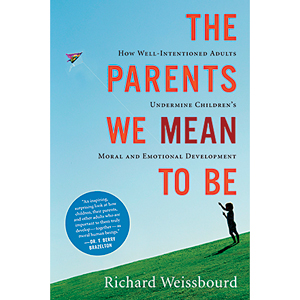
The Parents We Mean to Be – The Achievement Craze
“About 40 percent of students identified getting into a ‘good college’ as more important than being a ‘good person,’” writes Richard Weissbourd, author of The Parents We Mean to Be. Where are kids getting such outlandish ideas? According to Weissbourd, half of them claim their parents. Sadly, unless the do-gooding will impress a college admissions office, fewer and fewer kids as well as their parents are willing to waste their time on it.
“What’s more, many of us are inadvertently sending our children all sorts of double messages about the importance of achievement at high levels,” argues Weissbourd. Thanks to The Parents We Mean to Be, I realize despite my best intentions, I’m guilty of it, too – saying it’s who they are that matters yet gushing with admiration whenever I hear parents share how their child was accepted at an Ivy League school.
Part of the problem, as sociologist Arlie Hochschild puts it, “Parents are anxious about passing along to their children their own station in life. And they can’t do it through land or money in a meritocracy. You do it through your kid’s skills.”
While Weissbourd writes that these desires are a natural impulse, the reality is that “While it seems sensible to want to maximize their abilities, at some point it can dawn on children that maximizing their abilities may not make them happy – that we as parents are not talking about working at something that they love at a pace that feels comfortable to them.”
Weissbourd explains the research that indicates children who see achievement failures as personal failures are at risk for a plethora of troubles. Still, so many parents can’t seem to let up, fearing their child won’t be able to compete. As a result, children lie about their success in school and cover up their anxieties. Weissbourd believes, “When children have to closet feelings because they see them as unwanted and illegitimate, when they dread the disapproval of their parents when they fail or simply are not superstars, shame can also become a core, hounding aspect of the self.”
“Children find out who they are and what’s meaningful to them in part when adults are able, without agenda, to listen in a relaxed way and to reflect back their understandings and share their knowledge of the world,” explains Weissbourd. This is why The Parents We Mean to Be argues for parents to engage in honest self-reflection. Weissbourd calls for parents to stop clinging to rationalizations of the importance of achievement or their good motives.
Then, Weissbourd argues that parents need to examine the real moral power of schools. “Polls show that about 70 percent of public school parents want schools to teach ‘strict standards of right and wrong,’ and 85 percent want schools to teach values.” According to Weissbourd, research suggests that this is the result of stretched-thin parents who have come to doubt their capacities as mentors and want schools to take greater responsibility for their children’s character development.
However, as Weissbourd explains, schools have been experimenting with a variety of character education programs for decades now without improving students’ morality. Weissbourd believes part of the problem is the system’s neglect of parent-teacher relationships. “Parents can clearly be raw and defensive when they receive from teachers explicit or tacit criticism of their parenting…Often at bottom what parents want is for teachers to simply know and like their child, and when teachers talk only about performance or fail to express affection or praise, parents can feel cheated and shaken.”
Weissbourd maintains, “What makes so much of what passes as character education irrelevant – when it is not altogether a travesty – is that it has no impact on adults’ capacity to meet these crucial challenges. Worse, these programs not only don’t influence teachers’ mentoring or moral qualities; they can reinforce the idea that teachers and other adults are already highly morally evolved and simply have to transplant their values into their students.”
Furthermore, thanks to unreasonable burdens on teachers, many have become guarded and feel devalued. Therefore, while it’s important for parents to be advocates for their children, I think the real lesson in The Parents We Mean to Be is that adults and children alike are learning how to navigate not only successfully but happily in their communities every day. Until we all stop giving lip service to what’s most important and start working together constructively, I fear children will continue to fall victim to adults’ dangerous impulses to propel their children to greatness at the expense of their morality.
Like Parenting by the Book on Facebook or follow @WinterhalterV on Twitter for updates on blog posts.
Read my other blog Befriending Forty.






